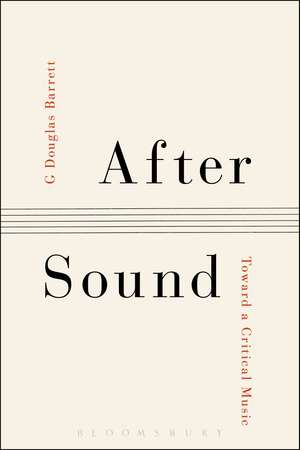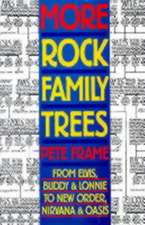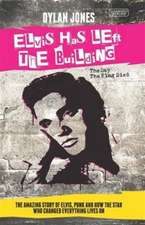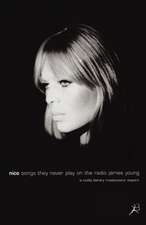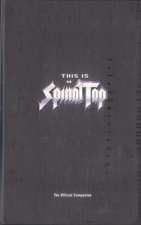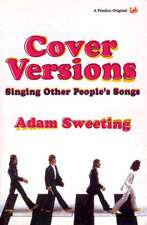After Sound: Toward a Critical Music
Autor G Douglas Barretten Limba Engleză Paperback – 10 aug 2016
| Toate formatele și edițiile | Preț | Express |
|---|---|---|
| Paperback (1) | 192.30 lei 6-8 săpt. | +47.79 lei 6-10 zile |
| Bloomsbury Publishing – 10 aug 2016 | 192.30 lei 6-8 săpt. | +47.79 lei 6-10 zile |
| Hardback (1) | 832.26 lei 6-8 săpt. | |
| Bloomsbury Publishing – 10 aug 2016 | 832.26 lei 6-8 săpt. |
Preț: 192.30 lei
Preț vechi: 223.15 lei
-14% Nou
Puncte Express: 288
Preț estimativ în valută:
36.80€ • 39.96$ • 30.91£
36.80€ • 39.96$ • 30.91£
Carte tipărită la comandă
Livrare economică 23 aprilie-07 mai
Livrare express 18-22 martie pentru 57.78 lei
Preluare comenzi: 021 569.72.76
Specificații
ISBN-13: 9781501308123
ISBN-10: 1501308122
Pagini: 256
Ilustrații: 6 bw illus
Dimensiuni: 152 x 229 x 15 mm
Greutate: 0.39 kg
Editura: Bloomsbury Publishing
Colecția Bloomsbury Academic
Locul publicării:New York, United States
ISBN-10: 1501308122
Pagini: 256
Ilustrații: 6 bw illus
Dimensiuni: 152 x 229 x 15 mm
Greutate: 0.39 kg
Editura: Bloomsbury Publishing
Colecția Bloomsbury Academic
Locul publicării:New York, United States
Caracteristici
Proposes a significant revision of the way we think about music through a series of intimate studies of visual and performing artists of the last ten years
Notă biografică
G Douglas Barrett is an artist and writer who works with music and visual art. Exhibiting and performing internationally, his critical writing is published in journals such as Postmodern Culture. He lives in New York.
Cuprins
Introduction: Music After Sound Silence and CollectivityChapter 1: The Limits of Performing Cage: Ultra-red's SILENT|LISTENChapter 2: The Silent Network: The Music of Wandelweiser Language and AuthorityChapter 3: "IDEAS MATTER": Zizek Sings Pussy RiotChapter 4: Music to the Letter: Noise, Language, and the Letter from Schoenberg Speculation and SenseChapter 5: The Debt of Philosophy: Music, Speculation, and The Sound of DebtChapter 6: The Metaphoricity of Sense: Hong-Kai Wang's Music While We Work - with Lindsey Lodhie Conclusion: Music After Art Acknowledgments Notes Selected Bibliography Index
Recenzii
[A] provocative thesis. ... Barrett summarises Cage's manifold aims in one brilliant paragraph ... [and] shows he can write lucidly ... I learned a lot from this book.
Barrett's book goes beyond the protesting of sound-art difference of Cox or Kim-Cohen and addresses the musicophobia of Kane. It identifies an important path and begins to move along it. Then think even harder and give us more ... If writing such as Barrett's constantly draws our attention back to the dynamic co-existence in music of absolute conceptuality and absolute materiality, and of the social and the individual, it's performing a vital task.
Doug Barrett's book marks a crucial intervention into the embattled and often confused contemporary discourses of the sonic. Deftly navigating between the Scylla and Charybdis of recent debates (so-called materialists [Cox] versus so-called idealists [Kim-Cohen]), Barrett's call for a 'critical music' offers new terms for thinking and practicing musical art. Against ahistorical theorizations of 'sound' as a novel field, Barrett seeks to provoke a genuine interdisciplinary encounter between music and contemporary art, philosophy, and politics.
Acts of intellectual courage are few and far between in these timid times. But Barrett throws caution to the wind. There is nothing absolute, he argues, about 'absolute music.' Except for a brief historical anomaly-lasting, roughly, from Beethoven to Boulez-music has always been embedded in the concatenations of history. What's more, music has always been the strange bedfellow of power and predicament, time and climate, finance and fellowship. Barrett absolves music (and us) of any recourse to the absolute. Where does that leave us? Here and now, thankfully.
After Sound is an ambitious and polemical contribution to the debates surrounding the porous domains of sound art, new music, and twenty-first century politics. It offers engaged interpretations of three collectives and five individual artists working at the borderlands of what is customarily taken as music, and handles a wide range of challenging and complex philosophical questions with remarkable ease.
An analyst in a crowded field of partisans, G. Douglas Barrett has given us a radical tool for apprehending the mess that we call music in the twenty-first century. Favoring clear-headed argument over strident polemics, he diagnoses the limits of discourse and practice in sound art, contemporary (visual) art, and new music by listening through and beyond them.
Barrett's book goes beyond the protesting of sound-art difference of Cox or Kim-Cohen and addresses the musicophobia of Kane. It identifies an important path and begins to move along it. Then think even harder and give us more ... If writing such as Barrett's constantly draws our attention back to the dynamic co-existence in music of absolute conceptuality and absolute materiality, and of the social and the individual, it's performing a vital task.
Doug Barrett's book marks a crucial intervention into the embattled and often confused contemporary discourses of the sonic. Deftly navigating between the Scylla and Charybdis of recent debates (so-called materialists [Cox] versus so-called idealists [Kim-Cohen]), Barrett's call for a 'critical music' offers new terms for thinking and practicing musical art. Against ahistorical theorizations of 'sound' as a novel field, Barrett seeks to provoke a genuine interdisciplinary encounter between music and contemporary art, philosophy, and politics.
Acts of intellectual courage are few and far between in these timid times. But Barrett throws caution to the wind. There is nothing absolute, he argues, about 'absolute music.' Except for a brief historical anomaly-lasting, roughly, from Beethoven to Boulez-music has always been embedded in the concatenations of history. What's more, music has always been the strange bedfellow of power and predicament, time and climate, finance and fellowship. Barrett absolves music (and us) of any recourse to the absolute. Where does that leave us? Here and now, thankfully.
After Sound is an ambitious and polemical contribution to the debates surrounding the porous domains of sound art, new music, and twenty-first century politics. It offers engaged interpretations of three collectives and five individual artists working at the borderlands of what is customarily taken as music, and handles a wide range of challenging and complex philosophical questions with remarkable ease.
An analyst in a crowded field of partisans, G. Douglas Barrett has given us a radical tool for apprehending the mess that we call music in the twenty-first century. Favoring clear-headed argument over strident polemics, he diagnoses the limits of discourse and practice in sound art, contemporary (visual) art, and new music by listening through and beyond them.
